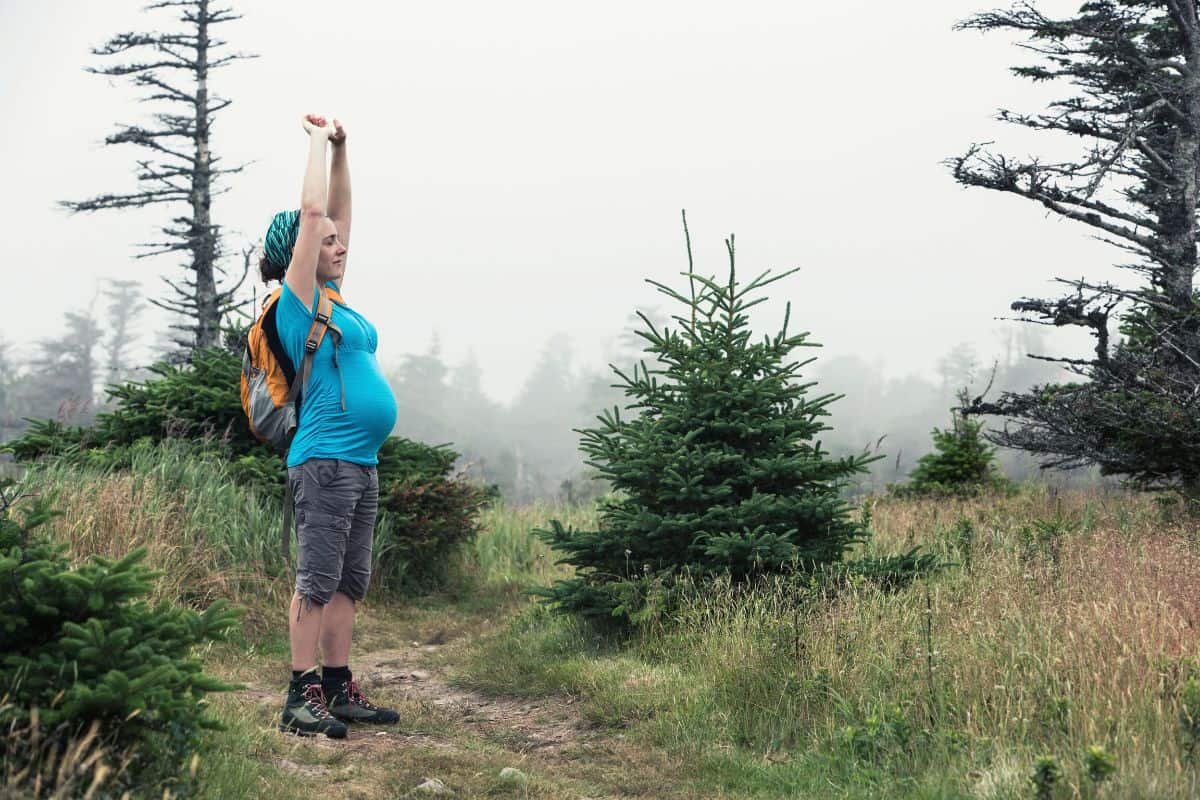Hikers with a baby on board may have some new, understandable concerns. Is it safe for your baby? Should you take it easy on the trail? Is there anything different I should carry in my backpack? These are all reasonable questions any pregnant outdoor enthusiast might be asking.
If you’re an avid hiker, it’s natural to want to stay active in nature after you’ve gotten over the initial excitement of a positive pregnancy test. You want to continue your hiking trips, get some fresh air and physical activity, and get back out on the trail asap. We get it.
But there are a few things to consider before you get back at it. But don’t worry! We’ve got you covered in this guide. Read on to answer your questions and soon enough you’ll be back to your usual activities (plus one).
Please note: we aren’t medical professionals, these are just our suggestions as fellow outdoor enthusiasts. Always check with your doctor before attempting any exercises while pregnant (see our first tip!).
Table of Contents
- Key Takeaways: Safely Hit the Trail During Pregnancy
- 1. Speak to Your Doctor
- 2. Choose Your Trail Carefully
- 3. Stay at Lower Elevations
- 4. Pack Carefully
- 5. Bring a Hiking Buddy
- 6. Use Trekking Poles/Hiking Poles
- 7. Stay Hydrated
- 8. Prepare to Pee (Lots)
- 9. Continue Snacking
- 10. Bring Your Cell Phone
- 11. Listen to Your Body
- Hiking While Pregnant: Doable!
1. Speak to Your Doctor
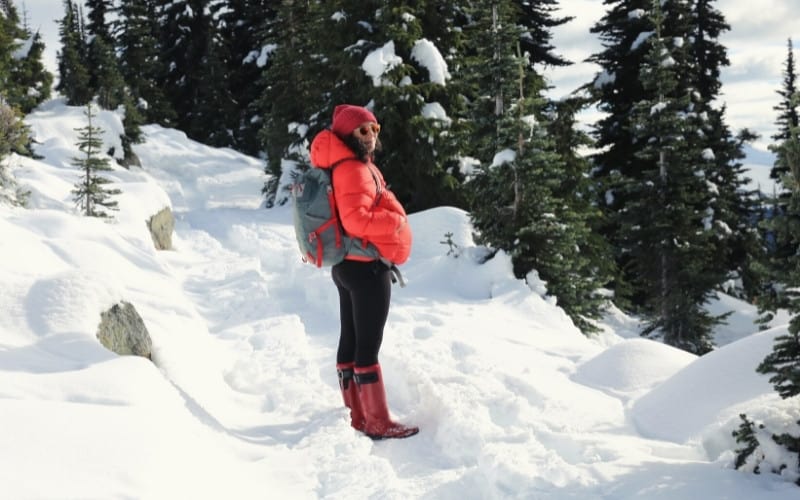
First and foremost, talk to your doctor before hitting the trail. During your earliest appointment, let your healthcare physician know your current activity level, the intensity of your typical hikes, and how you’d like to continue. It’s important to note the impact differences between taking an easy stroll along a paved pathway versus a rough, dirt trail.
Although exercise is often encouraged, it’s important to discuss your specific situation with your doctor, as every pregnancy is different. Something that works well for another mom-to-be may not be the best choice for you. Your doctor may even recommend restricting activity based on certain conditions.
It’s also important to continue the conversation with your doctor during follow-up appointments. Pregnancy changes your body and your activity level may need to evolve as well.
2. Choose Your Trail Carefully
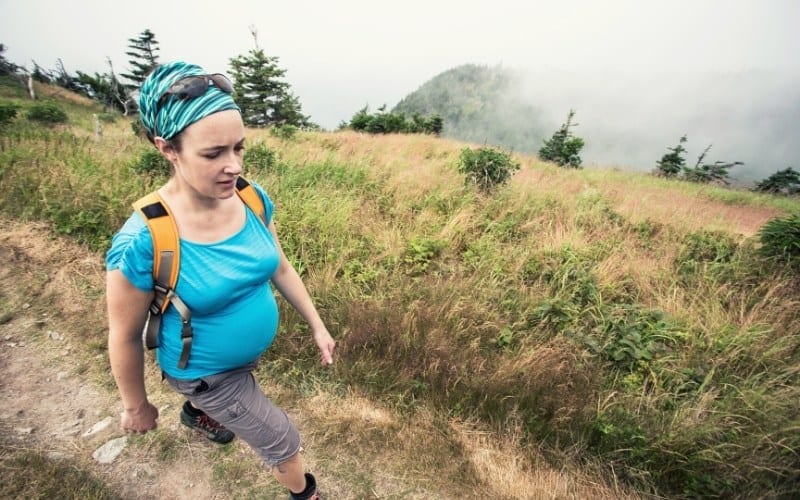
If you get the green light from your doctor, start with a route you already feel comfortable on and expand from there. Start with shorter hikes and easy courses, nothing too strenuous. As a general rule, avoid trails with sharp or slippery rocks, steep inclines/descents, or river crossings.
While exploring the unknown is part of the fun of hiking, it’s a better idea to go hiking on a path you already know and love. You don’t want to be surprised with some rock scrambling or narrow ledges. Also, read recent reviews of the trail to ensure you won’t come across any downed trees or rock slides that might be too tricky – or even dangerous – for you to cross.
Pregnancy changes your center of gravity and one small misstep can result in serious injury to you and/or your baby. Your sense of balance won’t be what it was prior to the baby weight, so take extra precautions.
3. Stay at Lower Elevations
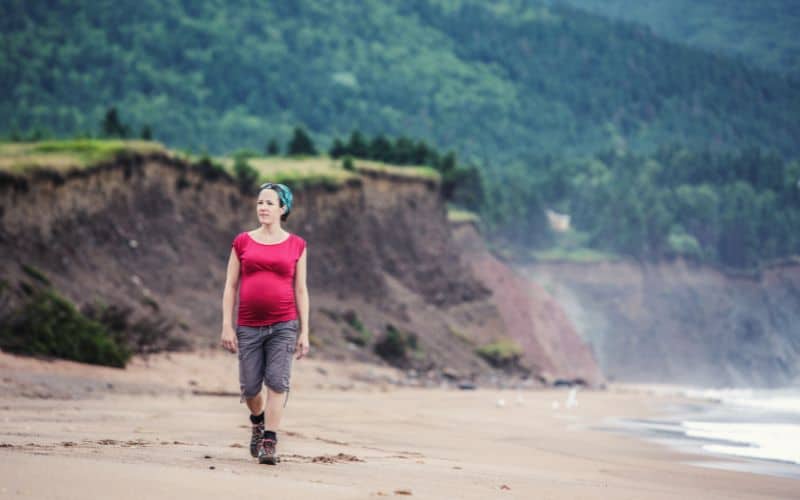
The higher you go above sea level, the less oxygen there is in the air. If you’re not getting enough oxygen, it’s possible to cause a condition called hypoxia in both you and your baby.
Health professionals often recommend pregnant women don’t travel higher than 8,000 feet. This also depends on what elevation you live at during the rest of the year.
4. Pack Carefully
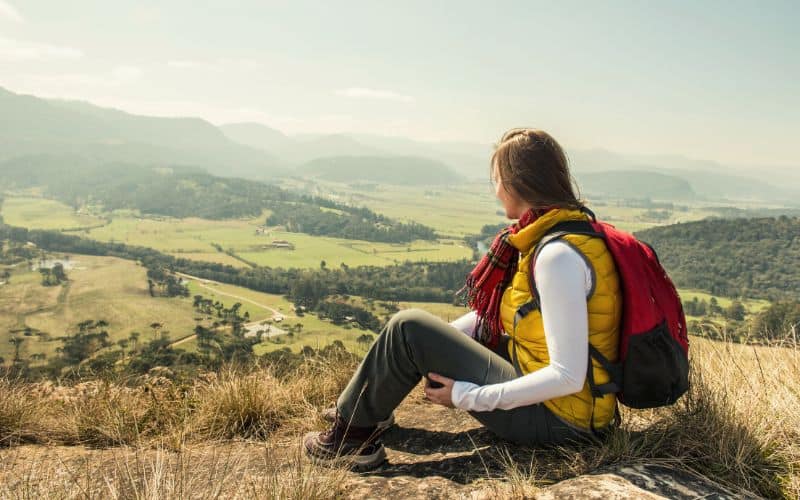
Depending on what stage of your pregnancy you’re at, it’s common sense that you’ll already be carrying around some extra weight. You don’t want to push yourself too hard with too much weight in your backpack. Your heart rate will increase, you’ll exert more energy, and your body will be extra working hard to haul around whatever you’re bringing out onto the trail.
In fact, consider letting whoever you’re hiking partner is to shoulder the bag. A friend on the trail has a lot of benefits for a pregnant woman (more on that in a minute!) and one of those is allowing them to take the weight of carrying the gear.
A heavy pack can also throw off your balance, which is already changing throughout your entire pregnancy.
5. Bring a Hiking Buddy
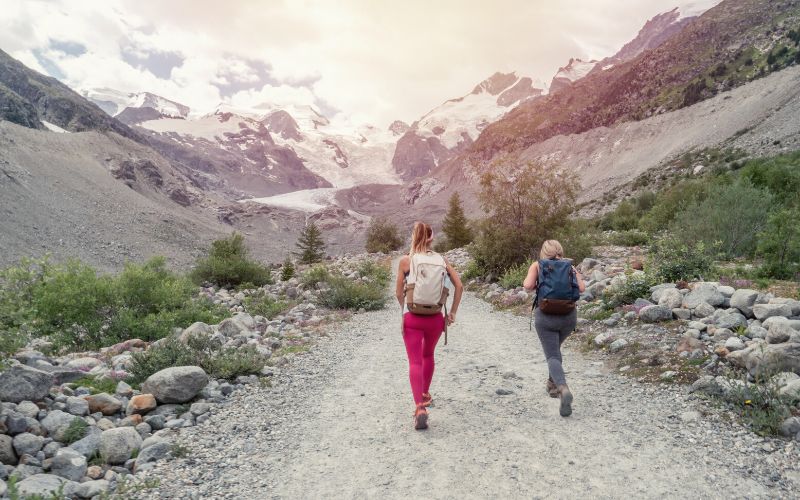
It’s a good idea to hit the trails with a friend as your pregnancy progresses. This is particularly important at high altitude, if there’s significant elevation gain, and as you get closer to your due date.
Even if you typically head out on solo treks, it’s an added precaution to ensure you and your baby’s safety just in case something were to go wrong. Your changing body can affect you in unusual ways. You don’t want your blood sugar to drop or your equilibrium to suddenly feel out of whack while you’re out on the trail alone. A friend could assist you or go get more help, if needed.
Bringing an adventure buddy will also help ensure you don’t overexert yourself. If you can carry on a conversation while hiking, you’re working out at the right level. If you’re out of breath and can’t make chit-chat, you should take the intensity down a notch.
6. Use Trekking Poles/Hiking Poles
Trekking poles can also come in handy when your changing body impacts your balance. Even if you’re not a fan of hiking poles, you should utilize them to help keep you steady, particularly in uneven terrain.
They’ll also be helpful as your joints tend to swell and get sore quicker when you’re carrying the additional baby weight.
7. Stay Hydrated
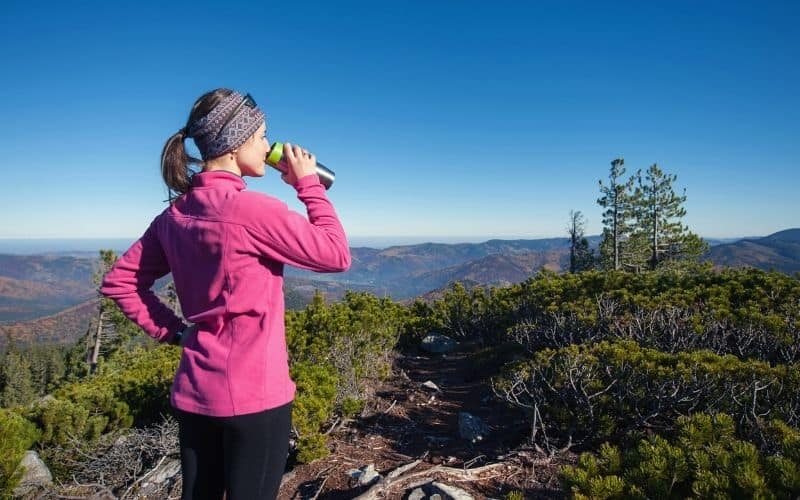
Staying hydrated is always important while hiking, and even more so if you’re hiking pregnant. This goes double if it’s sunny, humid, and/or hot outside. There are also supplements you can add to your water to help replenish your electrolytes.
You should drink before, during, and after your hike. If you’re out on the trail and feeling thirsty, that’s your body telling you you’re headed down the path of dehydration, so drink up.
Drinking enough water and replenishing your electrolytes will help you avoid muscle cramps. Water also helps your body absorb nutrients, which is important for your baby’s health. It can also help with swollen feet and ankles.
Although it varies based on your own body and diet, it’s usually recommended that pregnant women drink between eight to 10 8-ounce glasses of water every day.
8. Prepare to Pee (Lots)
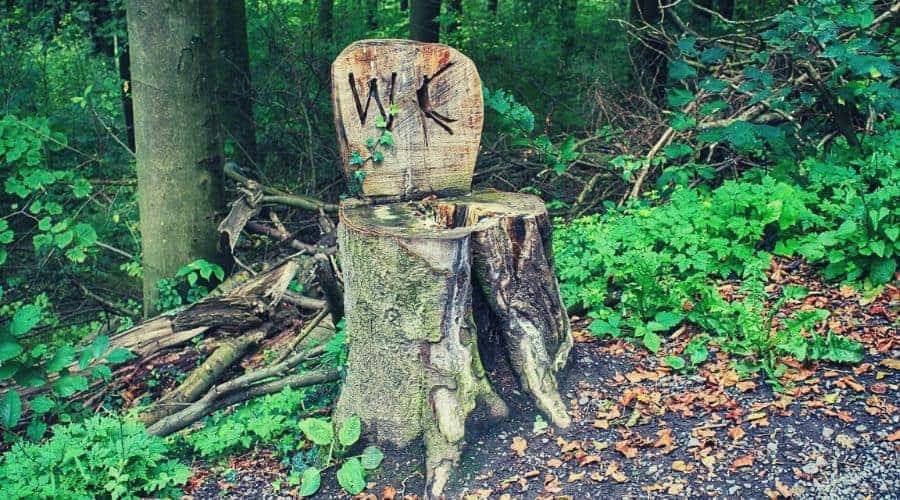
Pregnant women pee – a lot. So when you’re in the great outdoors and nature calls, it’s best to be prepared.
Bring toilet paper and/or cleansing wipes, plus a baggy to pack out your trash. Since it’s a little harder for a lady with a pregnant belly to squat (especially if you’re in your third trimester!), consider bringing a Shewee or another female urination device. This might make all the difference when you’ve really got to go while out on a hike.
Expect to take regular potty breaks since – if you’re properly hydrating – you’ll feel the urge to pee multiple times during any lengthy hike. Listen to your body and be prepared to pee.
9. Continue Snacking

Don’t forget, you’re eating for two now. If you feel hungry, munch on a granola bar or a pickle dipped in peanut butter, if that’s what you’re craving. Whatever you snack on, do it often enough to sustain your energy levels for the entirety of your hike.
Your energy may drain faster than normal because your body is working harder than normal. You’re growing a little human, that’s hard work!
Eat high-calorie foods before, during, and after your hike. Snacks that replace your electrolytes are ideal as you exert energy on your trek.
10. Bring Your Cell Phone
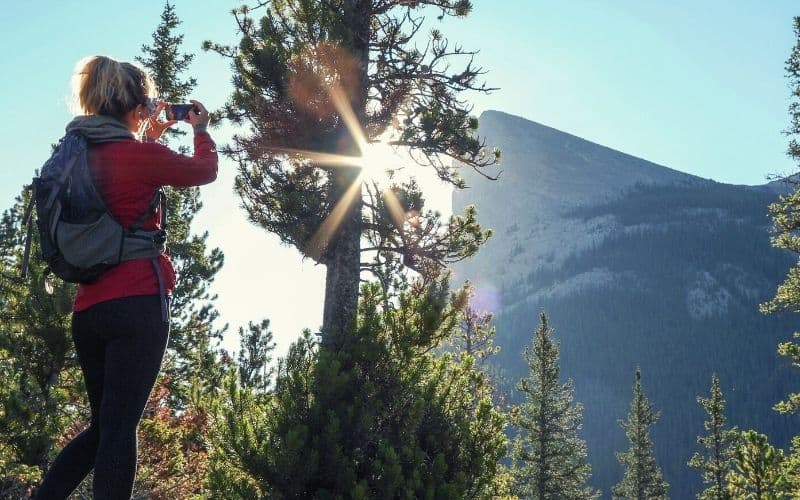
While some people like to leave their cell at home when they head out into the wilderness, you should bring it with you, just in case. This gets more important as you get closer to your due date.
Remember to turn on your location settings before heading out on your selected route. But don’t count on having a signal, have a backup plan to call for help, like Personal Locator Beacon or a satellite messenger (find one of these in best GPS for hiking).
It’s also a good idea (pregnant or not) to have a paper map, know the surrounding trails, and have at least a general sense of direction and identifying markers in case you get turned around.
11. Listen to Your Body
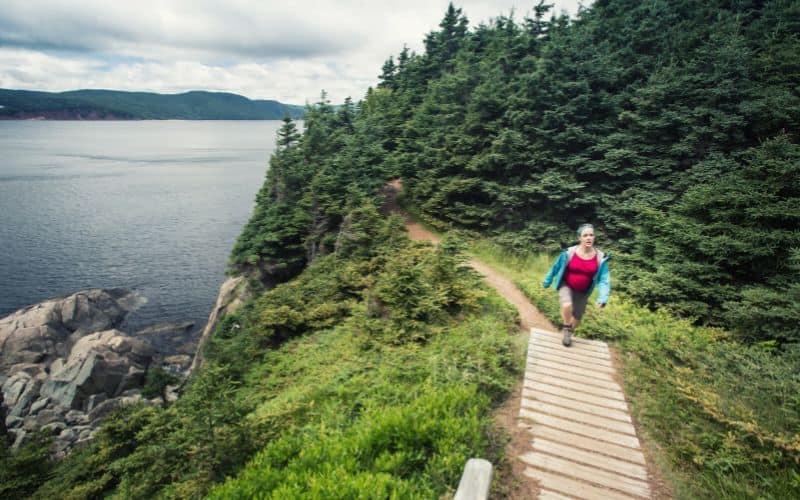
Remember to rest along the way. You don’t want to push yourself too hard and exhaust yourself, which might be easier to do during your first trimester, when you’re still in the mindset of tackling tough trails.
You’ll be going at a slower pace because of the added weight you’re carrying, so give yourself extra time to finish the hike.
If your hips or lower back are aching, consider wearing a support belt. If your feet are swollen, consider sizing up your shoe. Stretch your feet and move your ankles during rest breaks.
Most importantly, if you feel dizzy, lightheaded, chest tightness, abdominal pain, or other worrisome symptoms, hit the brakes and call your doctor.
Hiking While Pregnant: Doable!
If your doctor gives you the go-ahead, then hiking while pregnant can be safe, fun, and healthy! Staying active by hitting the trails also might be just what you need during your pregnancy.
Hopefully, our guide and these special considerations will help you make the most out of your hiking experience.
If you liked the article or have any questions, please use the comments box below. And if you know other women who might appreciate these tips, feel free to share this guide!
